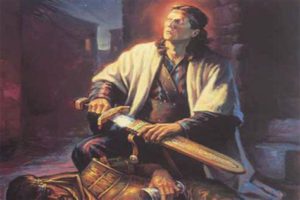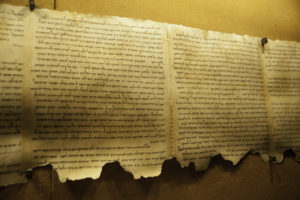In Part 3 of this series, we considered the potential origin and importance of the Brass Plates. In today’s post, we’ll look at what the Stick of Joseph has to say about their future use and destiny.
Though Lechi hailed from Joseph’s lineage and knew of the Brass Plates, it’s clear he didn’t know much about their true contents until he had read them. On this topic, Nefi reports the following:
And after they had given thanks unto the Elohim of Isra’el, my father Lechi took the records which were engraved upon the plates of brass and he did search them from the beginning. And he beheld that they did contain the five books of Moshe, which gave an account of the creation of the world and also of Adam and Havah who were our first parents, and also a record of the Y’hudim from the beginning, even down to the commencement of the reign of Tzidkiyahu, king of Y’hudah, and also the prophecies of the holy prophets from the beginning, even down to the commencement of the reign of Tzidkiyahu, and also many prophecies which have been spoken by the mouth of Yirmeyahu. And it came to pass that my father Lechi also found upon the plates of brass a genealogy of his fathers; wherefore, he knew that he was a descendant of Yosef, yes, even that Yosef who was the son of Ya’akov, who was sold into Egypt and who was preserved by the hand of YHWH that he might preserve his father Ya’akov and all his household from perishing with famine. And they were also led out of captivity and out of the land of Egypt by that same Elohim who had preserved them. And thus my father Lechi did discover the genealogy of his fathers. And Lavan also was a descendant of Yosef; wherefore, he and his fathers had kept the records (1 Nefi 1:22).
Thus we see that Lechi’s search of the records revealed the true extent of the information they contained, and also revealed Lechi’s genealogy to him. Nefi’s report treats all these items as if they were not fully known to Lechi until he had searched the plates. Lechi’s discovery of this information prompted an interesting response:
And now when my father saw all these things, he was filled with the spirit and began to prophesy concerning his seed — that these plates of brass should go forth unto all nations, kindreds, and tongues, and people, who were of his seed. Wherefore, he said that these plates of brass should never perish; neither should they be dimmed anymore by time. And he prophesied many things concerning his seed (1 Nefi 1:22).
Lechi here makes three specific prophecies by the Lord’s spirit. They are as follows:
- The Brass Plates will go forth to all nations, kindreds, tongues, and people who are of Lechi’s seed;
- The Brass Plates will never perish; and
- The Brass Plates will not be dimmed by time.
Let’s look at each of these three prophecies in order.
First, the prophecy about the plates going to all nations, kindreds, tongues and people would normally be considered to mean the whole world, but Lechi adds a qualification that the target audience is restricted to his seed. On its face, this appears to mean Lechi’s blood descendents, which would significantly limit the intended recipients. This would, of course, present interesting logistical challenges, given that the nature of information is that it’s hard to limit, and that there’s no reliable way of telling who descended from Lechi and who didn’t. So Lechi’s restriction must mean something else.
We find further explanation a couple of chapters later, when Lechi’s son Nefi has a conversation with an angel about future records to come forth, including future books (plural) to come forth, first to the Goyim (Gentiles) and then to the remnants of Lechi’s seed and to the Y’hudim (Jews). These prophesied books are to restore what was lost from prior records, and teach the truth about the Messiah (see 1 Nefi 3:24). One of those books is most certainly The Stick of Joseph in the Hand of Ephraim. But the record makes it clear there will be other books as well.
The angel then continues with the following statement:
And it shall come to pass that if the Goyim shall hearken unto the Lamb of Elohim in that day that he shall manifest himself unto them in word and also in power, in very deed, unto the taking away of their stumbling blocks, and harden not their hearts against the Lamb of Elohim, they shall be numbered among the seed of your father (1 Nefi 3:25).
Here, then, we find a much more broad definition of Lechi’s seed. According to the angel, Lechi’s seed consists of those who will hearken to the words of Messiah, and not harden their hearts against him. That is to say, those who will hear and believe the words of Messiah, delivered by those he sends, are considered by heaven to be Lechi’s seed. And as Lechi’s seed, they have a covenant right to the promised land, as well as all the prophesies and blessings concerning Lechi’s seed, including the right to receive the Brass Plates.
This expanded definition represents a bit of a plot twist in the unfolding destiny of the Brass Plates. The angel’s explanation greatly expands the target audience and makes them self selecting. Those who will hearken to Messiah’s words are those who will ultimately receive the Brass Plates record, because nobody else will listen or believe. The nature of God’s unfolding work is that it is easily dismissed by unbelievers. Both the Stick of Joseph and the Brass Plates fall into this category.
Further on in the Stick of Joseph, Alma teaches his son, Cheleman about the Brass Plates with these words:
And now, my son Cheleman, I command you that you take the records which have been entrusted with me…and these plates of brass which contain these engravings, which have the records of the holy scriptures upon them, which have the genealogy of our forefathers, even from the beginning. And behold, it has been prophesied by our fathers that they should be kept and handed down from one generation to another, and be kept and preserved by the hand of YHWH until they should go forth unto every nation, kindred, tongue, and people, that they shall know of the mysteries contained thereon. And now behold, if they are kept, they must retain their brightness, yes, and they will retain their brightness, yes, and also shall all the plates which do contain that which is holy writ (Alma 17:7).
Alma echoes Lechi’s prediction that the Brass Plates record will go to every nation, kindred, tongue, and people—but without Lechi’s limitation to his seed only. He also echoes Lechi’s other two prophecies, that the plates would:
“be kept and preserved by the hand of YHWH until they should go forth…” (Lechi said they “should never perish”); and
“they must retain their brightness, yes, and they will retain their brightness…” (Lechi said “neither should they be dimmed anymore by time.”)
The idea of the plates retaining their brightness can be a blog post by itself. To be brief, it seems clear this phrase doesn’t refer to the shiny or dull appearance of the metal on which the records are engraved. The very nature of engraving makes the records readable even on dull or tarnished metal. Rather, it seems to refer to the quality of the truth they contain and the light they will convey to those who will receive it. Knowledge of the Messiah is as important and necessary in our day as it was in times of old. The Brass Plates will ultimately go forth with power undiminished by time.
Alma stands as a second witness to Lechi’s three-fold prophecy, though he admits he does not fully understand or appreciate the future destiny of the Brass Plates. He recognizes how important the scriptural record is in ministering to the Nefites and Lamanites, and predicts it will be the means of perhaps bringing thousands to their Redeemer in a future day. He concludes that these plates are preserved for “a wise purpose” through which Elohim will “show forth his power unto future generations.”
And who knows but that they will be the means of bringing many thousands of them, yes, and also many thousands of our stiffnecked brothers the Nefites, who are now hardening their hearts in sins and iniquities, to the knowledge of their Redeemer. Now these mysteries are not yet fully made known unto me, therefore I shall refrain. And it may suffice if I say only they are preserved for a wise purpose, which purpose is known unto Elohim; for he does counsel in wisdom over all his works, and his paths are straight, and his course is one eternal round (Alma 17:7).
And now remember, my son, that Elohim has entrusted you with these things which are sacred, which he has kept sacred, and also which he will keep and preserve for a wise purpose in him, that he may show forth his power unto future generations (Alma 17:9).
And this brings us full circle to where we started, with the missing prophets of the Brass Plates. Though a number of prophets and prophecies have been removed from the scriptural record we have received in the Tanakh, those writings are not lost. Conspiring men may have thought they could suppress knowledge of the Messiah by tampering with scripture in ancient times, but God, who counsels in wisdom over all his works, was more wise than the foolish men who thought they could successfully oppose him.
The records are yet preserved, and the teachings will yet go forth. They will be the means of bringing many thousands to repentance and belief in their Redeemer, and will prove God’s power to accomplish his work. Part of God’s unfolding “marvelous work and wonder” will undoubtedly include the restoration of the Brass Plates record in the future. And I suspect we will be astounded just how much it contains.
May that day be soon.






Leave a Reply